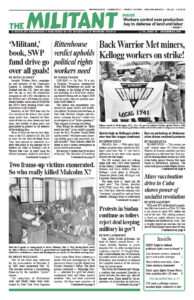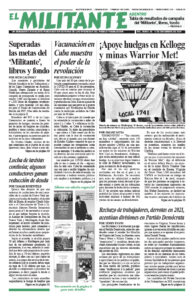Gen. Abdel Fattah al-Burhan, the head of Sudan’s armed forces, restored Abdalla Hamdok as prime minister Nov. 21, after ousting him in a military coup Oct. 25. Despite Hamdok’s reinstatement tens of thousands of people joined rallies in the capital, Khartoum, and elsewhere to demand the complete removal of the military from the government.
The Forces for Freedom and Change, a coalition that nominated Hamdok as prime minister two years ago, rejected the new setup. There should be “no negotiation, no partnership, no legitimacy for the putschists,” it said.
Hamdok’s return reinstates a transitional power-sharing arrangement between the military and capitalist parties reached in 2019 after weeks of street battles and strikes led to the overthrow of President Omar al-Bashir. Hundreds of thousands of working people joined those actions to demand an end to rising hardship, greater political rights and to oust al-Bashir, who devastated the country and orchestrated a civil war in Darfur in which tens of thousands were killed.
The Forces for Freedom and Change say that now they will no longer be part of Hamdok’s government. Many demonstrators chanted, “Hamdok has sold the revolution.”
The Sudanese Professionals Association, which had called many of the actions that led to al-Bashir’s ousting, said Hamdok’s decision to accept reappointment was “treacherous.”
Since the Oct. 25 coup, at least 41 people protesting military rule have been killed by security forces.
Hamdok’s announcement includes a promise to release detainees — hundreds of civilian officials and protesters jailed after the army takeover. He will appoint a cabinet and govern until elections in 2023. Since coming to office in 2019 Hamdok’s administration has protected the interests of the country’s capitalists and landlords. In June it ended subsidies that help working people get basic necessities.

